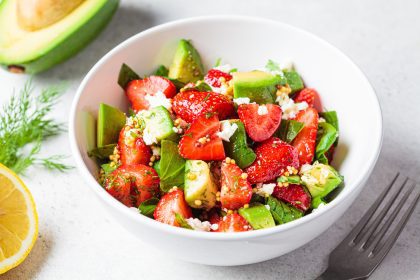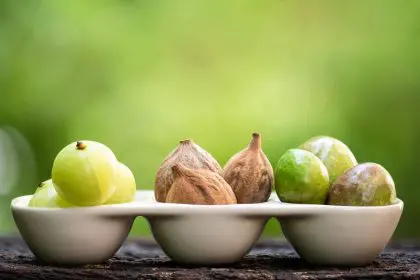Heartburn affects millions of Americans, with particularly high rates in the Black community. This burning sensation in the chest occurs when stomach acid flows backward into the esophagus, a condition known as acid reflux. While occasional heartburn commonly follows large meals or specific foods, chronic symptoms may indicate gastroesophageal reflux disease, requiring proper management through dietary modifications.
The 15 foods that fight heartburn
- Oatmeal stands as a premier breakfast choice, offering substantial fiber content that regulates digestion and promotes sustained fullness throughout the morning. This whole grain helps prevent overeating, a common trigger for acid reflux symptoms.
- Fresh ginger delivers powerful anti-inflammatory properties that calm the digestive system. Adding grated ginger to smoothies or brewing it as tea provides natural relief from heartburn discomfort.
- Bananas contain natural antacids that help neutralize stomach acid while providing essential nutrients and fiber for digestive health.
- Green beans offer a low-acid vegetable option rich in fiber and nutrients that support optimal digestion without triggering reflux.
- Melons, particularly honeydew and cantaloupe, provide hydration and essential nutrients while remaining gentle on the digestive system.
- Skinless chicken breast serves as an excellent protein source without the high fat content that often triggers heartburn symptoms.
- Brown rice provides complex carbohydrates and fiber that help stabilize digestion and prevent acid reflux episodes.
- Celery contains high water content and beneficial compounds that can help reduce stomach acid production.
- Chamomile tea soothes the digestive tract and reduces inflammation that contributes to heartburn symptoms.
- Almonds provide healthy fats and protein that can help absorb excess stomach acid.
- Sweet potatoes deliver essential nutrients and fiber while remaining gentle on the digestive system.
- Greek yogurt offers probiotics that support digestive health without excessive fat content.
- Quinoa provides complete protein and fiber while maintaining a neutral pH balance.
- Fennel, whether raw or cooked, contains compounds that can help reduce stomach acid production.
- Lean turkey offers protein without the fat content that often triggers reflux symptoms.
Foods that trigger heartburn
Understanding which foods to avoid proves equally important as knowing beneficial options. Common triggers include spicy foods, which can irritate the esophagus and increase acid production. Citrus fruits and tomatoes, despite their nutritional benefits, contain high acid levels that may worsen symptoms. Fatty foods, chocolate, and caffeine can relax the lower esophageal sphincter, allowing stomach acid to flow backward.
Strategic eating patterns for relief
Implementing proper eating habits significantly impacts heartburn management. Consuming smaller portions throughout the day helps prevent stomach overload and reduces pressure on the lower esophageal sphincter. Maintaining an upright position for several hours after eating allows gravity to keep stomach contents where they belong.
Beyond dietary choices, several lifestyle adjustments can help manage heartburn effectively. Maintaining a healthy weight reduces abdominal pressure that can force stomach acid upward. Wearing loose-fitting clothing prevents unnecessary pressure on the stomach area. Elevating the head while sleeping helps prevent nighttime reflux episodes.
Cultural considerations and adaptations
Traditional Black American cuisine often includes dishes that may trigger heartburn symptoms. However, modifying cooking methods and ingredients can help preserve cultural food traditions while preventing discomfort. Using herbs and spices instead of hot peppers, baking instead of frying, and incorporating more vegetables into soul food recipes can maintain flavor while reducing heartburn risk.
When to seek medical attention
While dietary changes significantly impact heartburn management, persistent symptoms warrant medical evaluation. Chronic heartburn may indicate underlying conditions requiring professional treatment. Black Americans should remain particularly vigilant about seeking medical care, as studies show higher rates of complications from untreated acid reflux in this community.
Creating an effective heartburn prevention strategy requires consistency and awareness. Keeping a food diary helps identify personal triggers and safe foods. Planning meals ahead ensures access to heartburn-friendly options throughout the day. Gradually incorporating beneficial foods while eliminating triggers allows for sustainable dietary changes that provide lasting relief.

















